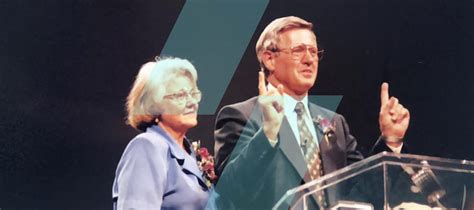A Quote by T. S. Eliot
We know too much, and are convinced of too little. Our literature is a substitute for religion, and so is our religion.
Quote Topics
Related Quotes
Now, brethren, this is one of our greatest faults in our Christian lives. We are allowing too many rivals of God. We actually have too many gods. We have too many irons in the fire. We have too much theology that we don't understand. We have too much churchly institutionalism. We have too much religion. Actually, I guess we just have too much of too much.
We drink too much, smoke too much, spend too recklessly, laugh too little, drive too fast, get too angry, stay up too late, get up too tired, read too little, watch tv too much. We have multiplied our possessions but reduced our values. We talk too much, love too seldom, and hate too often. We've learned how to make a living but not a life. We've added years to life, not life to years.
In the blood-heat of pursuing the enemy, many people are forgetting what we are fighting for. We are fighting for our hard-won liberty and freedom; for our Constitution and the due processes of our laws; and for the right to differ in ideas, religion and politics. I am convinced that in your zeal to fight against our enemies, you, too, have forgotten what you are fighting for.
When we get out of highschool we'll look back and know we did everything right, that we kissed the cutest boys and went to the best parties, got in just enough trouble, listened to our music too loud, smoked too many cigarettes, and drank too much and laughed too much and listened too little, or not al all.
Religion is an important institution. A nation without religion cannot survive. Yet it is also very important to note that religion is a link between Allah and the individual believer. The brokerage of the pious cannot be permitted. Those who use religion for their own benefit are detestable. We are against such a situation and will not allow it. Those who use religion in such a manner have fooled our people; it is against just such people that we have fought and will continue to fight. Know that whatever conforms to reason, logic, and the advantages and needs of our people conforms equally to Islam. If our religion did not conform to reason and logic, it would not be the perfect religion, the final religion.
What our view of the effectiveness of religion in history does at once make evident as to its nature is--first, its necessary distinction; second, its necessary supremacy. These characters though external have been so essential to its fruitfulness, as to justify the statement that without them religion is not religion. A merged religion and a negligible or subordinate religion are no religion.
Religion is part of the human make-up. It's also part of our cultural and intellectual history. Religion was our first attempt at literature, the texts, our first attempt at cosmology, making sense of where we are in the universe, our first attempt at health care, believing in faith healing, our first attempt at philosophy.
You see, it's been our misfortune to have the wrong religion. Why didn't we have the religion of the Japanese, who regard sacrifice for the Fatherland as the highest good? The Mohammedan religion [Islam] too would have been more compatible to us than Christianity. Why did it have to be Christianity with its meekness and flabbiness?
Does history warrant the conclusion that religion is necessary to morality - that a natural ethic is too weak to withstand the savagery that lurks under civilization and emerges in our dreams, crimes and wars? ... There is no significant example in history, before our time, of a society successfully maintaining moral life without the aid of religion.






































